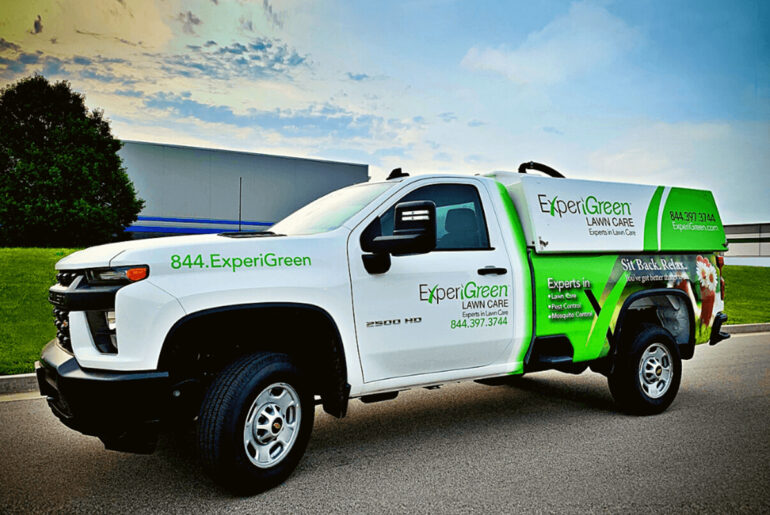With a lot of hard work and commitment, you’ve built a lawn care business from the ground up. Although your business is thriving and profitable, you’ve decided it’s time to sell. Selling a landscaping business can be quite a lucrative business opportunity, and it’s often easier than you may think.
How do you put your lawn care business for sale? Here’s everything you need to know about how to sell a landscaping business:
- Why Sell Your Lawn Care Business?
- How to Prepare Your Business for Sale
- How to Market Your Landscaping Business for Sale
- How to Successfully Negotiate with Potential Buyers
- The Benefits of Buying a Landscaping Company
- How to Make Your Business So That Anyone Can Run It
- Benefits of Using Lawn Care Business Software
- Partnering with RealGreen
- Final Thoughts
Why Sell Your Lawn Care Business?
Creating your lawn care business wasn’t easy. You put a lot of time and effort into building a successful company. But, for many owners, letting go of the business is harder than creating it.
However, keep in mind that selling your business does require some prep time. You’ll want to take a month or two to prepare your business before putting it on the market. Proper preparation makes the sale easier and more financially lucrative.
Generally, business owners want to sell when they’re ready to retire and have no heirs interested in inheriting the business.
Additionally, you might want to sell your business if you need a large infusion of cash. Even if your business is profitable, you might find yourself in a situation where you need cash in hand. Selling your business allows you to turn its value into real money you can use however you like.
Finally, you might want to sell your business if it’s performing poorly. If you’re unable to attract the clients you need to grow the business, it might make more financial sense to sell as soon as possible.
How to Prepare Your Business for Sale

Proper preparation is key to a successful sales process. Your business should be a turn-key operation. That means it’s entirely ready for the new owner to use right away. Here are the initial steps to take before putting your businesses up for sale:
Minimize Outstanding Account Balances
You want as few outstanding invoices as possible when determining your selling price. Potential buyers will be reluctant to buy your business if it has a long cash flow cycle and an unattractive balance sheet. Clear up your accounts receivable as much as possible to increase your company’s total working capital.
Avoid Customer Concentration
You want a diverse customer base. If the vast majority of your annual revenue originates from only a handful of customers, potential buyers will be wary about future profits, especially if many of your customers have a personal relationship with you.
Instead, diversify your customer base as much as possible with both commercial accounts and residential accounts. While some existing customers might drop off with new ownership, having a large base helps reassure a potential buyer that your business will remain profitable in the future.
Focus on Commercial Clients
Commercial clients are often the biggest moneymakers for a lawn care business. While you want residential clients in your company’s portfolio, make sure you have a robust assortment of commercial clients, too.
Keep Your Equipment Well-Maintained
Make sure all your company’s gear is in tip-top shape. A new owner doesn’t want to replace outdated equipment. Although purchasing new equipment right before you sell your business might seem counterintuitive, doing so often makes your business easier to sell.
Establish Proper Documentation for Your Workers
The landscaping industry attracts a variety of undocumented workers. Some potential buyers might not care if you have undocumented workers on your team, while others will. Generally, if all of your workers are documented, you’ll have an easier time selling your business.
Encourage Long-Term Contracts
Your business will appear more attractive to buyers if you have orders from customers already in place. Encourage customers to commit to long-term contracts. Potential buyers want reassurance that your existing customers are unlikely to cancel service when you sell the business.
How to Market Your Landscaping Business for Sale

Once you decide to sell, you need to get the word out to potential buyers and consider hiring a business broker. In many ways, marketing your business to sell it is similar to the marketing you’re already doing to attract customers, only with a slightly different focus.
When marketing your lawn care business for sale, emphasize all the elements that make your business unique. The barrier to creating a landscaping business is fairly low. If someone is in a financial position to buy your business, they’re also capable of starting their own landscape company from scratch.
So, what is it about your company that’s the most difficult to replicate? The answer is also your main selling point.
Generally, you’ll want to emphasize three components:
- Customers
- Services
- Staff
Customers
Your existing loyal customer base is one of your biggest assets. After all, any new lawn care company will have to develop its own client list, a process that can take years. Ideally, your residential or commercial customer base will consist mainly of repeat customers who pre-pay and are committed to long-term contracts, as that’s the type of base most attractive to buyers.
Additionally, you’ve already done all the logistical legwork. When someone buys your business, they’re not just getting your customers; they’re also getting a ready-to-go dispatch system that maximizes efficiency.
Services
The services you provide are another selling point. Most lawn care organizations provide a variety of general services, including lawn maintenance, weed control, and tree services like tree removal, stump grinding, or tree care. While there’s nothing wrong with the basics, you also want to emphasize any specialized services you offer.
Potential buyers also want to see a variety of off-season services. It’s far easier for a new owner to earn a profit if the business doesn’t have to shut down entirely during the winter months. A lawn care company that also offers snow removal services during part of the year often appeals to potential buyers.
Generally, the biggest moneymakers for a landscaping service are regular services provided to commercial clients. Emphasize these profit leaders when marketing your lawn care company for sale.
Staff
Finally, potential buyers are often far more interested in people than equipment. After all, replacing equipment isn’t particularly difficult, but replacing experienced employees is a huge hassle.
Prospective buyers typically want assurances that most of your existing employees plan to stay on board after the sale. A long-term management team is a major selling point.
You might find advice suggesting you require all your employees to sign non-compete agreements. However, non-compete agreements are generally more trouble than they’re worth. First, it’s difficult, legally, to prevent an employee from working in landscaping entirely. Also, restrictive non-compete agreements often discourage qualified employees from wanting to work with you in the first place.
Start Using Lawn Care Software!
How to Successfully Negotiate with Potential Buyers

You’ve prepared your landscape business for sale and marketed it successfully. Now you’ve made contact with a potential buyer. But you’re not over the finish line yet! The next step is to negotiate with the buyer to get the best deal possible.
First, don’t be afraid to walk away. If you’ve attracted one potential buyer, you can almost certainly attract more. If the deal doesn’t seem like a good fit, feel free to wait until you have an offer you’re more comfortable with.
Also, keep your emotions in check as much as possible. Selling your beloved company can stir up many mixed feelings. Don’t reject a solid offer by looking at your business through rose-colored glasses. It’s often helpful to hire an impartial expert, like an attorney with experience in the landscape industry, to negotiate on your behalf with qualified buyers.
The Benefits of Buying a Landscaping Company

Don’t lose sight of why someone might want to buy your business. Keeping the benefits in mind can help you remain confident during any frustrating parts of the sale.
First, landscaping is consistently popular. According to a survey from the National Association of Landscape Professionals, 44% of all U.S. adults with lawns hire a professional to maintain them. That’s just a little under half of all lawns. A lawn care business has the potential to generate steady profits for a long time.
Another benefit of buying an existing landscaping company is the opportunity for acquisition. Don’t be surprised if a competitor expresses interest in buying your business. They can expand their operation either by folding your company into theirs or operating the new company under the existing name.
How to Make Your Business So That Anyone Can Run It

If a competitor or other lawn care professional buys your business, they’ll likely have their own preferences for how to run it.
However, lawn care doesn’t have a high technical barrier to entry. Many prospective buyers might not have a ton of experience in the lawn care industry. You can appeal to these buyers by making your business as easy as possible to run.
We touched on this earlier when describing your business as a turnkey operation. The new owner should be able to run your business with minimal fuss from the first day.
Understandably, this idea can feel insulting. You created the business. Its success is the result of your expertise and experience. Unfortunately, your knowledge and skills don’t have a dollar amount you can put on the sale price. Instead, you’ll want to set up your business so your departure has a minimal impact on day-to-day operations.
An experienced management team helps make the new owner’s life easy. Empower team leaders to make decisions and implement ideas. Of course, this doesn’t happen overnight. Turn responsibilities over to your team gradually during the life of your business.
Also, document your processes. Explain the rationale behind your decisions, such as pricing, wages, scheduling, and more. Understanding what hasn’t worked in the past is often valuable information for the new owner.
Benefits of Using Lawn Care Business Software
The use of lawn care business software in today’s digital era significantly boosts efficiency and organization, leading to potential business growth.
Lawn care business software offers features to schedule appointments, track job progress, manage invoices and payments, avoid double bookings, monitor client preferences, and ensure timely payments all on one platform.
Partnering with RealGreen
Partnering with RealGreen for your lawn care business can bring numerous benefits. RealGreen offers professional lawn care software specifically designed for lawn care businesses, making it easier for you to manage all aspects of your operations.
Some of the key benefits of partnering with RealGreen include:
1. Streamlined Operations: Streamline your day-to-day operations, from scheduling appointments to managing invoices and tracking employee performance. This can save you time and reduce the likelihood of errors.
2. Improved Customer Service: Easily keep track of customer information, preferences, and history. This allows you to provide personalized service and build stronger relationships with your clients.
3. Mobile Application: Provides technicians with the necessary tools to efficiently complete service and work orders, document conditions for potential upsells, and enhance the overall customer experience.
4. Enhanced Reporting and Analytics: Provides valuable insights into your business performance, allowing you to make informed decisions and improve your operations over time.
5. Financial Services: You can borrow anywhere from $1,000 to $1 million to help with your business needs. With quick access to funds in as little as 24 hours, you can ensure that your operations run smoothly and efficiently.
*Funding is provided by YouLend; WorkWave is not providing the credit. Prequalified offers are based on sales and are subject to a credit check. YouLend terms and conditions apply.
Final Thoughts
When it comes to selling a lawn care or landscaping business, preparing for a smooth transition is crucial. Establishing your operation as a turnkey business allows the new owner to step in with ease and confidence. This means delegating responsibilities to an experienced management team and documenting processes clearly so that operational continuity is assured even after your departure.
Utilizing lawn care business software, like that offered by RealGreen, can significantly enhance the efficiency and organization of your business. The software not only streamlines operations but also improves customer service through better tracking and communication. By leveraging such tools, you make your business more attractive to potential buyers who are looking for a seamless transition and an established customer base. Reach out today to schedule a free demo!





